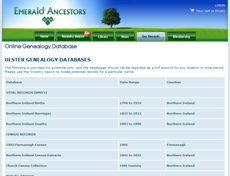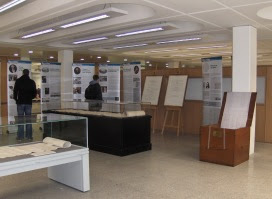Tuesday 19 March: Kerry in the 17th Century, with Dr Marc Caball. Host: The Kerry Archaeological and Historical Society. Venue: National Library of Ireland, Kildare Street,
Dublin 2. 6:30pm. Admission free. All welcome.
Tuesday 19 March: Family history – Getting started, with Cork Genealogical Society. Venue: Hollyhill Library, Foyle Avenue,
Knocknaheeny, Cork. 11am. Free.
Wednesday 20 March: DNA – Brick Wall Buster? with Dr Maurice Gleeson. Host: Irish Genealogical Research Society. Venue: National Library of Ireland, Kildare Street,
Dublin 2. Free. 7pm. Open to members and non-members alike.
Details.
Wednesday 20 March: Celebrating our Irish Roots. 1:30-4:00pm. Open to members and public. Free. Host: Quebec FHS. Venue: QFHS Heritage Centre & Library, 173 Cartier Avenue,
Pointe-Claire.
Details.
Thursday 21 March: WW1 Family History Roadshow. Bring your memorabilia to the National Library of Ireland, Kildare Street,
Dublin where it can be digitised and added to the Europeana online archive, along with stories that bring these objects to life. Places limited.
Book in advance only.
Thursday 21 March: Local History Fair; an information day and series of talks with history groups, PRONI, North West Digital Film Archive, Mellon Centre for Migration Studies and others. Venue: Derry Central Library, 35 Foyle Street,
Derry BT48 6AL. 8:30am to 8pm. Free. Tel: +44 (0)28 7127 2310.
Thursday 21 March: Urban Landscape, a Round Table panel. Part of the PRONI/OU lecture series entitled Urban History. Venue: PRONI Lecture Theatre. Titanic Quarter,
Belfast. 6:30pm. Free.
Thursday 21 March: For God and Ulster? Presbyterians and Politics in Ballymena during the Home Rule Crisis. Mr Philip Or. Host: Presbyterian Historical Society. Venue:
Newtownbreda Presbyterian Church, 374-378 Ormeau Road, BT7 3HX8pm (7.15pm AGM of the Society).
Thursday 21 March: Locked out in Galway and Dublin 1913, a HistoryIreland Hedge School at the Mechanics Institute, Middle Street, Galway. 8pm. €5/€3.
Friday 22 March: Getting started with your family history, with Edward Wallace. Cork Genealogical Society. Venue: Tory Top Library, Ballyphehane,
Cork. 2:15pm–3:30pm. All welcome.
Saturday 23 March: Scots-Irish Research, with John Mears. Immigration from the 1600s to the 1800s and associated research techniques. WISE FHS
Denver, Colorado.
Details.
Saturday 23 March: Family History Day, at Dublin City Library & Archive, Pearse Street,
Dublin 2. Programme of five lectures. Free. No booking.
Details.
Saturday 23 March: An introduction to Irish family history, a workshop with Dr Irene O’Brien. Venue: Family History Centre, Level 3, The Mitchell Library, North Street,
Glasgow G3 7DN. 10am–1pm. Cost £15. Places are limited. Booking essential, tel: 0141 287 2999.
FULLY BOOKED.
Saturday 23 March: Scots-Irish genealogy research seminar, with Fintan Mullan and Brian Trainor, UHF. Co-Hosted by the Genealogical Society of Marion County and The Indiana Historical Society (IHS). Venue: Basile Theater, The Eugene and Marilyn Glick Indiana History Center, 450 W. Ohio St. in downtown
Indianapolis. 9am start. Cost $28 IHS and GSMC members$35 non-members. Register online. Tel: (317) 232-1882 for more information.
Monday 25 March: The Buildings and landscape of the Plantation of Laois and Offaly, with Mairtin D'Alton. Offaly Historical & Archaeological Society. Venue: Bury Quay,
Tullamore, Co. Offaly (beside Tullamore Dew Visitors Centre). All are welcome. Entrance €2 to members and €5 to non members.
Enquiries.
Tuesday 26 March: '
We weare so fast tyed in consanguinitie, alliance and amitie'? Inter-ethnic marriage and the colonial community of Dublin, Meath, Louth and Kildare c.1400-c.1540, with Dr Sparky Booker. Host: Irish Historical Society. Venue: Centre for Irish Programmes, Boston College Dublin, 42 St Stephen's Green,
Dublin 2. 7pm. All welcome.
Tuesday 26 March: The Hiring Fairs: Memories of the People of the NorthWest, with Roy Hamilton. Host: Northern Ireland Family History Society, Coleraine Branch. Venue: Guide Hall, Terrace Row,
Coleraine. 8-10pm.
Wednesday 27 March: Councils and Corporations: Local Government in Belfast, with Ian Montgomery. PRONI lunchtime lecture at the LinenHall Library,
Belfast. Free. 1pm.
Wednesday 27 March: The Irish in London, with Finbarr Whooley. Host: Skibbereen and District Historical Society. Venue: West Cork Hotel,
Skibbereen. 8:30pm. All are welcome to attend. A small contribution will be required from non-members.
Wednesday 27 March: Fusilier or Volunteer: Who to commemorate? A History Ireland Hedge School with Tommy Graham, Edward Madigan, Roisin Higgins, Shane Mac omais and Robert Ballagh. 7:30pm. Venue: Glasnevin Cemetery Museum.
Dublin.
Thursday 28 March: AGM and Lecture: Genealogical records from the 17th century, with Dr William Roulston. Host: Northern Ireland Family History Society, Ballymena Branch. Venue: Michelin Arts Workshop, Braid Arts Centre, 1-29 Bridge Street,
Ballymena. 7:15pm–9:15pm.
Thursday 28 March: All at Sea - Maritime records at PRONI, with Dr Anne McVeigh. Derry City Council’s Heritage and Museum Service Spring Lecture Series. Venue: Tower Museum, Union Hall Place,
Derry BT48 6LU. Time: 12.30pm. Free. Book by telephone on 028 7137 2411 or
email.
 The 1911 and 1901 Censuses of England & Wales are available to search and view free of charge this Easter at Ancestry.co.uk. The 1901 Scotland census is also included.
The 1911 and 1901 Censuses of England & Wales are available to search and view free of charge this Easter at Ancestry.co.uk. The 1901 Scotland census is also included.


















